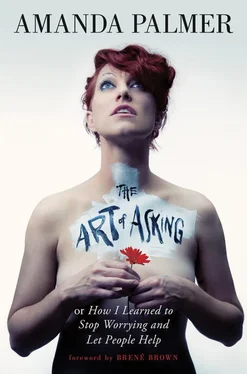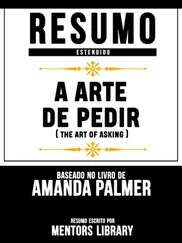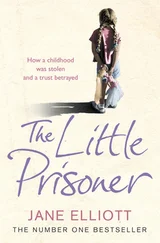I figured, if my fans were okay with it, I could be okay with it. Because really, who was trying to impress whom?
I’d thought that I already had a relatively healthy body image, but this moment shifted things for me. I started to take a sense of pride in my own “flaws.” I blogged about the wrinkly crease on my forehead, challenging myself to accept it, I twittered a picture of my thigh stretch marks. Every piece of sharing opened a floodgate of shared insecurities and relieved “it’s not just me” comments and photos from men and women alike.
And bit by bit, I started judging myself a little less harshly every time I looked in the mirror. The fans gave me that gift, very directly. They weren’t some imaginary enemy, sizing me up and judging my weight, my skin, my tits, my ability to look perfect. They didn’t care how the package delivering the music—me—looked as long as we were all making one another happy, and taking care of one another.
They were all just a bunch of people.
The imaginary enemy had been in my head.
If I had an enemy at all, it was the label.
• • •
Anthony never really asked me for anything—certainly never for money, I didn’t have any. He hated lateness, so he would ask me to be punctual for our groks. [5] “to grok”: from Robert Heinlein’s made-up word from Stranger in a Strange Land , meaning to communicate and understand deeply, empathetically, completely.
He also asked, usually joking, that I love him unconditionally, and without judgment, which was easy. That was love, or so I was learning. It was what he was teaching me.
But one time he asked me for something specific, and big. I was in my midtwenties, in the midst of making the first Dresden Dolls record. It was Christmastime, so I was kicking around closer to Boston for a few days, off tour, to be with my family and spend time on the couch in Anthony’s study, recuperating and grokking.
We’d been talking on the phone almost every day that month, and I knew that Anthony’s wife, Laura, had been going through a rough time, and he’d been worried about her. He’d been going through a pretty hefty depression himself. I’d take breaks from the studio and from cranking out vocals and fiddling with piano levels to check in and see how he was doing.
Laura and I hadn’t been very close when I was a teenager; she’d wondered, like everyone else in the neighborhood, what this angsty teenage girl was doing hanging out with her husband all the time. And she just looked to me like… an adult. But once I hit my twenties and created my own life, while deepening my friendship with Anthony, we started to understand and even love each other. We never got as close as Anthony and I had, but we became warmer friends. Allies.
They never had kids. I was sort of the closest thing.
Anthony was older than Laura. He started morbidly musing one night about how he hoped she would die first, just so she wouldn’t ever have to be alone without him.
But if I do die, look after her, okay? he said. It’s been haunting me lately. I can’t handle the idea of her being alone. I can’t stand the idea of her falling down the stairs, and being hurt… any of that. Just promise me you’ll check in if I check out .
A few nights later, I wrote him a letter. On Christmas Eve, I walked across my folks’ lawn to his study. I knocked the snow off my boots and collapsed onto the couch.
Here, I wrote you something .
It was a pretty simple letter. He poured me a glass of wine from a bottle in his little study fridge, and sat down to read it.
I promise I’ll take care of Laura if you die , the letter said.
I’ll watch out for her, I’ll check in, I’ll make sure she isn’t too alone .
And I’ll do it not because you asked me .
Not because you love me .
I’ll do it because I love her, even though she barely knows it .
I’ll do it because you’ve taught me what love is, and how easily you can give it .
I’ll take care of what you love .
I’ll be there for Laura when you’re gone and you’re not around to do it .
I promise .
He put the letter down and looked at me.
That was the first time I saw Anthony cry.
• • •
My blog readership grew steadily as I started to dump more of my inner self onto the page. I shared the backstage stories, I promoted the shows, I asked for volunteers, I posted digital postcards from every visual and emotional vantage. I publicly thanked anyone who helped us. I was punch-drunk from the instant gratification of sharing life in real time, the random closeness, the feeling that I wasn’t going through my struggles alone. When things went well, I blogged. When they went badly, I blogged. I tried not to sugarcoat. Sometimes I would post a short blog and get back over a thousand comments in which people would share their own stories, their own experiences. Sometimes I’d post a lengthy commentary about something I found fascinating, and get little or no response. I learned to love that about my fans: they weren’t sheep, they were people. I never knew what to expect, or how they’d react.
People started using me to help one another. I wrote blogs about body image and watched discussions and confessions explode in the comments, because people (of all genders) felt safe talking to one another. I took a poll on Twitter about health insurance. I asked people to provide: 1) COUNTRY?! 2) profession? 3) insured? 4) if not, why not, if so, at what cost per month (or covered by job)? Thousands responded. I posted the poll results on my blog and watched teenagers from the UK and the US now discussing health care, amazed by the fact that their systems were so different. They hadn’t known.
The dots kept connecting. One day, I stumbled across the story of Amanda Todd, a Canadian teenager who had committed suicide after being bullied, online and off, by some cruel kids in her school. A few months before her death, she’d posted a plea for help on YouTube, in which she simply held up written signs telling her story of loneliness, suicide attempts, and fear.
I posted the story and her video to the blog. It had hit a nerve for me. I’ve become adept at fielding Internet hate bombs: people hated my band, my lyrics, my eyebrows, my videos, my feminist politics, my armpit hair. I’d gotten used to waking up to a daily assault of love and hate coming at me over the Internet, and dealing with all those emotional landmines was becoming a skill in itself. I was a thirty-five-year-old who had grown a thick skin, and it was still a daily struggle. Amanda Todd was a kid. Fifteen. I couldn’t imagine being the target of an Internet hate campaign at fifteen. I wrote about all of this, and a young woman named Shannon Eck commented on the blog:
Story time. I am fat. I’m not a fan of being fat and have, in fact, struggled with it my entire life…
She told us about a boy named Austin who used to torment her in gym class, calling her a cow, making up songs about how she was a fat bitch, and about how much she struggled to deal with his constant onslaught of cruelty. And about how a few months into that school year, Austin killed himself. And about how she wept the day he died.
Most bullies are the way they are because of how they have been treated , she wrote. They just don’t know any different. They don’t know how to deal with their emotions, so they lash out. Austin’s death broke my heart, but it made me open my eyes. What if I had tried to just talk to him? Would it have made any difference? Probably not. But at the end of the day, we’re all human. We’re all broken in a way, and we’re just trying to feel whole. I try to understand where people are coming from, even if they are being horrible to me. When I would get mean messages online, I would instantly retaliate with something equally terrible and soul-crushing. After Austin, I didn’t do that .
Читать дальше












